
by Rob Davies and Tim Shipman
18 July 2012
from
DailyMail Website
HSBC moved huge sum from Mexico into the U.S.
between 2007 and 2008
Provided services for Saudi Arabia's Al Rajhi Bank linked to financing
terrorism
Senate investigation suggests they also moved money tied to Iran
Accuses bank of 'pervasively polluted' culture
Another hammer blow to the credibility of British banking system
after Barclays was fined for allegedly rigging
LIBOR interest rate
Britain's biggest bank allowed rogue states and drugs cartels to launder
billions of pounds through its branches.
HSBC stands accused of fostering such a ‘polluted’ culture it became a
conduit for criminal enterprises.
A top executive at the bank sensationally quit yesterday in front of a US
Senate hearing that exposed the scale of the scandal (watch video and end
page).
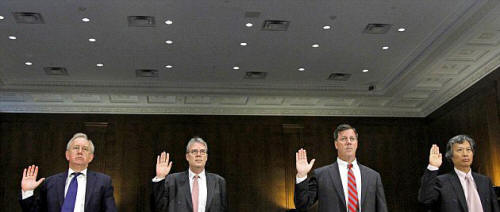
Investigation: Mr Bagley, left, is sworn in at the
Washington subcommittee, alongside Paul Thurston, chief
executive of Retail Banking and Wealth Management HSBC
Holdings plc, Michael Gallagher, former executive Vice
President and head of PCM North America HSBC Bank USA, N.A.,
and Christopher Lok, former head of Global Banknotes for
HSBC Bank USA
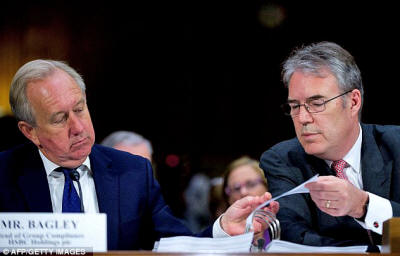
Assessing the evidence: Mr Bagley, left, and Paul Thurston,
also of HSBC,
study documents during their appearance in
Washington today
Following the Barclays rate-fixing revelations, it deals another blow to the
City of London’s reputation.
HSBC - one of the few UK banks to survive the financial crisis with its
reputation intact - now faces up to £640million in penalties. A devastating
335-page Senate report accused HSBC of ignoring warnings and breaching
safeguards that should have stopped the laundering of money from Mexico,
Iran and Syria.
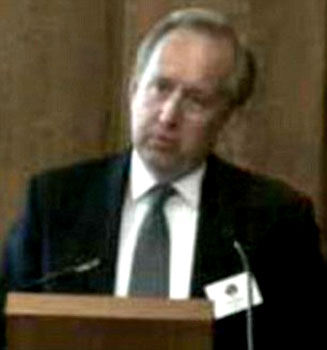
Stepping down: David Bagley quit his post before the
Homeland Security and
Governmental Affairs subcommittee in
Washington today
The bank failed to monitor a staggering
£38trillion of money moving across borders from places that could have posed
a risk, including the Cayman Islands and Switzerland.
The failures stretched
to dealings with Saudi Arabian bank Al Rajhi, which was linked to the
financing of terrorism following 9/11.
HSBC’s American arm, HBUS, initially severed all ties with Al Rajhi. But it
later agreed to supply the Saudi bank with US banknotes after it threatened
to pull all of its business with HSBC worldwide.
According to the report, HBUS also accepted £9.6billion in cash over two
years from subsidiaries without checking where the money came from.
In one instance, Mexican and US authorities warned HSBC that £4.5billion
sent to the US from its Mexican subsidiary ‘could reach that volume only if
they included illegal drug proceeds’.
Concerns over the bank’s links to Mexican drug dealers included £1.3billion
stashed in accounts in the Cayman Islands. One HSBC compliance officer
admitted the accounts were misused by ‘organised crime’.
London-based banker David Bagley, head of HSBC’s compliance division, which
is meant to prevent breaches of the law, quit in front of the Senate
committee. He had been with the bank for 20 years.
The affair is also an embarrassment for David Cameron, because his trade
envoy Stephen Green chaired HSBC during the period covered by the
allegations.
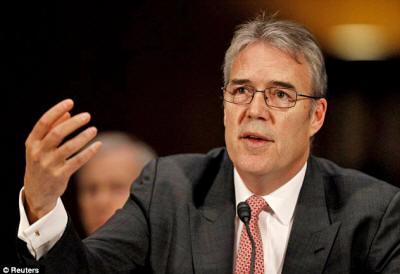
Evidence: Paul Thurston, HSBC Chief of Retail and Wealth
Management,
said the bank 'took wrongdoing seriously'
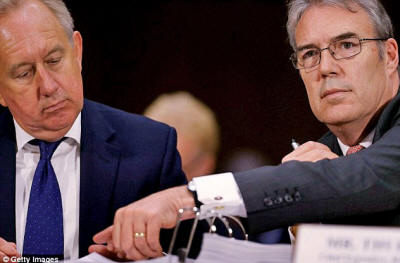
Mr
Thurston, pictured with Mr Bagley, gave evidence to the
subcommittee
describing the difficulties the bank had in
working in Mexico
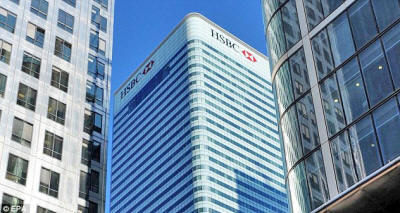
Powerhouse: HSBC headquarters in the City of London.
The
bank has been accused of laundering money for the Mexican
mob
John Mann, a Labour MP on the influential
Treasury committee, last night demanded that Lord Green resign or be sacked.
‘Someone whose bank has been assisting
murdering drug cartels and corrupt regimes across the world should not
be in charge of a government portfolio,’ he said.
A spokesman for the Prime Minister backed the
peer - officially known as Baron Green of Hurstpierpoint - saying he
was doing an excellent job and would play an important role during the
Olympics. No 10 sources said Mr Cameron has not questioned Lord Green about
his role in the scandal.
Labour MP Pat McFadden, a member of the Treasury select committee, stopped
short of calling for Lord Green to resign over the affair, but said the
trade minister should be quizzed over what he knew.
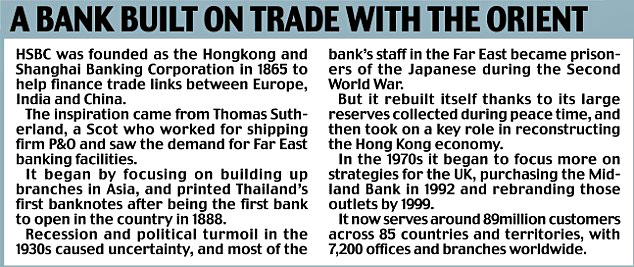
‘I don’t know the timeline of this, but if something was going on at the
time anyone was chairman of the bank they should be expected to be asked
questions about this,’ he said.
Evidence in the Senate report shows that HSBC
staff sought to get round sanctions that prevent American firms doing
business with Iran.
It said:
‘From 2001 to 2007, HSBC affiliates sent
almost 25,000 transactions involving Iran worth over $19billion
(£12billion) through HBUS and other US accounts, while concealing any
link with Iran in 85 per cent of the transactions.’
The bank’s compliance division,
‘allowed the HSBC affiliates to continue to
engage in these practices, which even some within the bank viewed as
deceptive, for more than five years without disclosing the extent of the
activity to HBUS’.
Many of HSBC’s breaches relate to its use of
so-called bearer share accounts, in which ownership of shares and the income
they incur can be passed from person to person in secrecy.
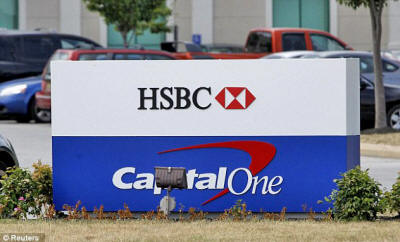
An
HSBC facility in New Castle, Delaware. Executives insist
that after years of run-ins with U.S. authorities over
alleged anti-money laundering lapses, they have cleared
up their act
Senator Carl Levin, a Michigan Democrat
who is leading the investigation, said HSBC had been ‘pervasively polluted
for some time’.
He added:
‘Banks that ignore money laundering rules
are a big problem for our country. In an age of international terrorism,
drug violence in our streets and on our borders, and organized crime,
stopping illicit money flows that support those atrocities is a national
security imperative.’
In a statement, HSBC said:
‘We will apologize, acknowledge these
mistakes, answer for our actions and give our absolute commitment to
fixing what went wrong.’
The bank says it has sharpened up its controls
and doubled spending on compliance to £255million.
It also said it was closing 20,000 accounts in the Cayman Islands as a
result of the investigation.
HOW HSBC BECAME THE SUBJECT OF A U.S. SENATE
INVESTIGATION
The U.S. Senate Permanent Subcommittee on
Investigations has been investigating HSBC for months as part of an
effort by Congress to probe shadowy money flows.
It began in February this year when U.S. senator Carl Levin said he
planned to refer HSBC Holdings to its U.S. bank regulator in connection
with questionable accounts it provided for senior Angolan officials.
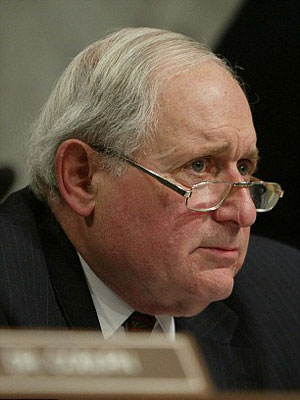
Probe: Senator Carl
Levin referred HSBC
to bank regulators in connection with questionable
accounting
Senator Levin, who chairs the Permanent Subcommittee on Investigations
was particularly scathing about HSBC and the role of a Connecticut
office of the bank in providing offshore accounts in the Bahamas nearly
a decade ago to the Angolan central bank.
At the time he said:
'They've got some real regulatory
problems in terms of their obligation to know their customers here
in America.'
Mr Levin said he was not pleased with
answers given at a hearing by Wiecher Mandemaker, director of general
compliance for HSBC Bank USA.
'I thought his answers were very
unsatisfactory.'
Asked to comment about Levin's remarks,
HSBC, Europe's largest bank, said it takes compliance matters very
seriously.
'HSBC's record demonstrates a commitment
to vigorous enforcement and continuous enhancement of anti-money
laundering policies and practices'.
A subcommittee report said attempts in 2002
by the then-head of the Angolan central bank, Aguinaldo Jaime, to
transfer $50 million in government funds to the United States had been
rebuffed by Citigroup (C.N) and Bank of America (BAC.N).
Nonetheless, Levin said at the hearing, London-based HSBC helped the
Angolan central bank avoid a British court order freezing some of its
assets.
The title of the hearing is,
'Vulnerabilities to Money Laundering,
Drugs, and Terrorist Financing: HSBC Case History.'
Saudi terror links

Terror funding?
The probe has examined links between
HSBC
and the Saudi Arabian Al Rajhi Bank
The Senate probe also examined banking HSBC did in Saudi Arabia with
Al Rajhi Bank, which the report said has links to financing terrorism.
Evidence of those links emerged after the
Sept 11, 2001 attacks on the
United States, the Senate report said, citing U.S. government reports,
criminal and civil legal proceedings and media reports.
In 2004, Al Rajhi sued the Wall Street Journal, which had published an
article about U.S. and Saudi authorities monitoring accounts. The article
referenced Al Rajhi.
Al Rajhi said in response to a WSJ story that it 'unequivocally condemns
terrorism'. Al Rajhi and the paper settled in 2004.
The paper did not pay damages and stated that it,
'did not intend to imply an
allegation that (Al Rajhi) supported terrorist activity, or had engaged in
the financing of terrorism', the Senate report said.
In 2005, HSBC told its affiliates to no longer do business with the bank,
the report said.
Four months later, HSBC officials reversed course, allowing
affiliates to decide whether to continue to do business with Al Rajhi.
A Middle Eastern unit of HSBC continued doing business with the bank, the
report said. HSBC ultimately stopped helping the bank handle certain types
of transactions, and HSBC compliance officials rebuffed other HSBC bankers
seeking to maintain ties to the bank.
Then in late 2006, Al Rajhi threatened to yank all of its business with HSBC
unless it regained access to using HSBC's bulk-cash transaction business,
the Senate report said.
HSBC - THE DAMNING FINDINGS
The focus of the Senate probe was HSBC's U.S. operations, which has its
main office in New York.
HSBC used the U.S. unit as a selling point to clients outside the United
States, touting its ability to handle U.S. dollar transactions.
Among HSBC's problems, the report described the bank's compliance
division failed to investigate the suspect money. High turnover of top
compliance officials made it difficult for reform to take hold, the
report said.
Employees were 'overwhelmed' by a mounting
number of suspect transactions that needed review.
'We're strapped and getting behind in
investigations,' one bank official wrote in June 2008.
By that time, HSBC was cutting costs to
offset losses tied to subprime home loans and the brewing financial
crisis.
In 2010, one disgusted top compliance official threw up his hands and
quit after less than a year on the job, according to the report.
Typical of the problems inside the bank were transactions tied to
Mexico, a country the report said is,
'under siege from drug crime, violence
and money laundering'.
HSBC, according to the report, helped move
money for a Mexican foreign-exchange dealer called Casa de Cambio Puebla
that served as a hub for laundered proceeds, according to the report.
Between 2005 and 2007, there was a 'growing flood' of U.S. dollars
moving between the exchange house and HSBC, setting off red flags inside
HSBC.
Some bankers said the transfers were legal. One said the money came from
Mexican landscapers working in the United States and routing money back
home to their families.
HSBC ultimately closed the account in November 2007 after it received a
seizure warrant from the Mexican attorney general seeking money tied to
the exchange dealer, the Senate report said.
HSBC agreed to continue to provide the bank bulk shipments of U.S. dollars
until 2010 when HSBC exited entirely the bulk-cash business.
Officials at Al Rajhi could not immediately be reached for comment.
Dealings with Iran
Some of the money that moved through HSBC was tied to Iran, the report said,
which would violate U.S. prohibitions on transactions tied to it and other
sanctioned countries.
To conceal the transactions, HSBC affiliates used a method called
'stripping,' where references to Iran are deleted from records.
HSBC
affiliates also characterized the transactions as transfers between banks
without disclosing the tie to Iran in what the Senate report called a 'cover
payment.'
HSBC 'failed to take decisive action to
confront these affiliates and put an end to the conduct,' the report
said.
Between 2001 and 2007, more than 28,000
transactions were identified by an outside auditor for HSBC that potentially
could have run afoul of laws that prohibit transactions with sanctioned
countries.
Of those, 25,000 involved Iran. A smaller number required additional
analysis to determine if violations of U.S. regulations had occurred, the
report said.
At the heart of HSBC's failings was the fact that it served as a hub for
smaller financial firms needing access to the global banking system, the
report said.
In one example detailed in the Senate investigation, HSBC continued to do
business with one client that admitted to U.S. law enforcement that it had
failed to maintain an effective anti-money laundering system.
The client,
Sigue Corp, was a money processor in California, the report
said. In 2008, the company agreed to a so-called deferred prosecution with
the U.S. Justice Department and other U.S. agencies where it admitted to
allowing millions of dollars of suspect transactions between 2003 and 2005.
Undercover U.S. officers, in a sting, even moved money through the company,
explicitly telling Sigue agents they were moving illegal drug proceeds, the
report said.
HSBC Executives admit mistakes,
commit to deal with
money-laundering allegations...
|










